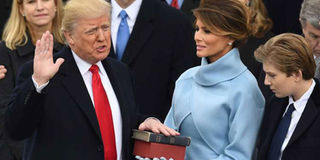Trump's protectionism will affect politics, industry and policy around the world

Donald Trump is sworn in as president at the United States Capitol in Washington, DC on January 20, 2017. PHOTO | MANDEL NGAN | AFP
What you need to know:
- As a businessman, Mr Trump made private profits, now he must get political, economic and social profits for the American public.
- If you export to the US, be prepared to be taxed heavily and face tariffs.
When a billionaire global businessman becomes the world’s most powerful political leader, how many steps does he have left to get atop Abraham Maslow’s self-actualisation apex?
Just one: Change the USA’s economic fortunes and, with that, the world’s. An egoistic winner, President Donald Trump can neither stand failure on the world’s greatest stage nor fail to deliver on his signature campaign call.
He must perform to make America great (winner, leader, maker, hirer) again. That means a major force of disruptive change has descended on earth. The change is beginning at home but will impact globally because its vehicle is trade.
As a businessman, Mr Trump made private profits, now a public servant, he must get political, economic and social profits for the American public. He must create enablers for businesses to prosper and for their wealth to cascade to Americans.
Protectionism, a dirty word and hitherto an un-Republican position, is his chosen route. That means if you export to the US, be prepared to be taxed heavily and face tariffs.
Protectionism commands American firms to make in America and hire American in exchange for generous tax cuts and limited regulation. If they manufacture overseas, they will pay substantial border taxes to sell in America.
Protectionism means renegotiate, UK, Swedening the painstakingly forged Bill Clinton-era North American Free Trade Agreement with Canada and Mexico. And it is why Mr Trump withdrew America from the complex 12-nation Barack Obama-inspired Trans Pacific Partnership (TPP).
Protectionist Trump is an American economic nationalist out to create and protect wealth and jobs in America for Americans. He will, therefore, care little for globalisation (when business and businesses go global), which he believes benefits only multinational fat cats.
Right wing columnist Patrick Buchanan nails it: “Economic patriotism and ethnonationalism, personified by Trump, seem everywhere ascendant. Transnationalism is yielding to tribalism.”
Economic patriotism imposes barriers to promote and protect local businesses. Transnationalism promotes interconnectivity between nations, thereby diminishing the importance of physical, fiscal and cultural boundaries.
So, how will Mr Trump’s economic nationalism impact the world? One, Mr Trump defines America’s interests through a cost benefit prism. His line is that there will be no free trade but fair (or smart) trade.
That doomed TPP, which Mr Trump last year dismissed as skewed against American workers, thanks to “stupid politicians” who don’t know deal making.
The White House has also argued that there cannot be free trade when Vietnam, for example, gains access to American markets under TPP yet has little to offer America.
FINANCIAL WEIGHT
Two, note President Trump’s attack on NATO as obsolete before his inauguration, and lament at the inauguration that America’s allies do not pull their financial weight.
It is significant because he was saying that trans-Atlantic institutions created because of World War II, like NATO, or even the UN, are no longer fit for purpose yet unnecessarily burden the American taxpayer.
Three, it is not surprising that, uncharacteristically, President Trump did not talk about America’s role in the world at his inauguration. But he left no doubt that America’s military will henceforth protect only America and Americans.
Four, President Trump is disinterested in the European Union. He has dismissed it as a German vehicle and called the UK vote to quit the union (Brexit) last June smart and a search for British identity. He wants a deal with the UK but wishes the EU collapses.
Five, the President is anti-open immigration and has labelled Germany’s intake of 1 million migrants last year catastrophic. Brexit and Mr Trump’s victory have energised anti-EU and anti-immigration parties in France, Germany and the Netherlands.
Six, President Trump wants to establish closer ties with Russia, a declining former superpower, but he is hostile towards China, a fast rising economic power, especially regarding trade.
While sanctions-crippled Moscow wants a supportive White House, flourishing Beijing will fight fire with fire.
So as Washington fights TPP which, deliberately, excluded China, Beijing is building the 16-member Regional Comprehensive Economic Partnership (RCEP) which, deliberately, excludes America.
Last, Mr Trump and the world will soon know the difference between running a company and governing a country.





